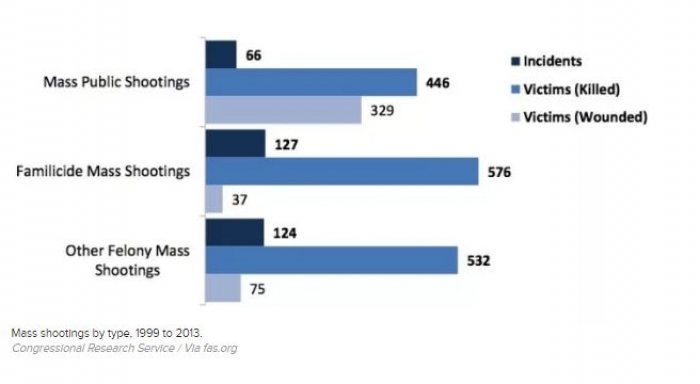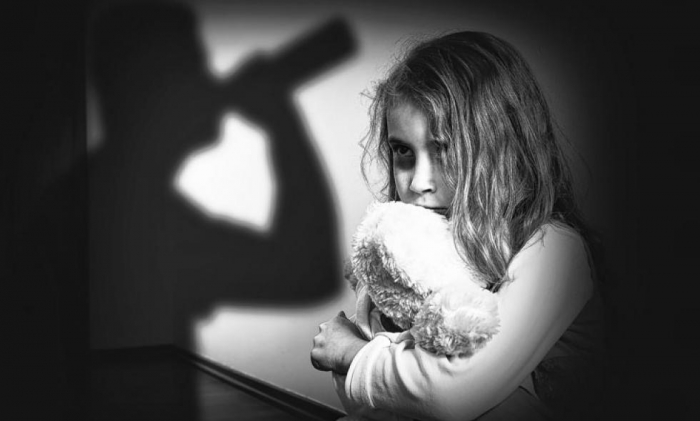A history of domestic violence is a common thread in many American mass shootings, and often spouses and other family members are the victims.
“Mass shootings are domestic violence events much more commonly than the public believes,” Garen Wintemute, who heads the Violence Prevention Research Program at the University of California, Davis, told BuzzFeed News by email.
What’s more, women who’ve previously been assaulted by their partners are at high risk of being murdered if there are firearms in the house. Yet states differ on restrictions on gun ownership for domestic abusers, and researchers still don’t know whether the perpetrators of domestic violence present a high risk for gun homicide more generally.
The mass shootings that attract most attention are those that happen in public places, ending the lives of apparently random victims. But a 2015 report by the Congressional Research Service, covering incidents from 1990 to 2013 in which four or more people were killed, found that “familicides,” involving the murders of former intimate partners or family members, were the most frequent, and accounted for the largest number of deaths.

Next most common were “other felony” shootings, linked to criminal activity or arguments outside of the family.
Mass shootings in public places like schools, restaurants, or places of worship were rarer. And the Congressional Research Service found that about one-fifth of these were possibly triggered by a domestic dispute, even if the victims were all or mostly unrelated.
The perpetrators of mass shootings often kill themselves, and those whose victims include their partners seem to lie at the extreme end of a lethal trend. In a paper presented on November 2 at an Association for Public Policy & Management conference in Chicago, Sierra Smucker and Philip Cook of Duke University studied more than 800 intimate-partner murders over a decade in North Carolina. One-quarter of the perpetrators killed themselves, and more than half of these men killed at least one more victim, in addition to their partner. Just 3% of the perpetrators who didn’t commit suicide had multiple victims.
Under a 1996 federal law called the Lautenberg Amendment, anyone convicted of misdemeanor domestic violence should be barred from gun ownership. But there are loopholes, which according to The Trace include the fact that the military justice system lacks a distinct charge for domestic violence. This means that service members convicted of domestic assaults, like Kelley, may not be flagged in the FBI’s National Instant Criminal Background Check System. Air Force officials have confirmed that Kelley’s conviction was not entered into the FBI’s database.
Federal law also prohibits gun ownership for some men served with domestic violence protective orders. But the abuser must have been able to plead their case at a hearing, and the gun ban is limited to orders protecting abusers’ intimate partners, and their own or their partners’ children.
State laws vary, with some imposing much tougher restrictions. In California, for instance, temporary or emergency restraining orders, issued without a hearing, are enough to prohibit gun ownership. These orders can protect any family member, whether or not they have ever lived with the abuser.
Laws like these were introduced to protect the women who are most at risk for domestic violence — and with good reason. In 2003, researchers led by Jacquelyn Campbell of the Johns Hopkins University School of Nursing in Baltimore found that women in abusive relationships were five times more likely to be killed by their partner if he owned a gun.
In its latest study of women murdered by men, released in September, the Violence Policy Center in Washington DC found that at least 55% of the victims in 2015 were shot. Of these, 64% were killed by their intimate partners.
Laws intended to take guns out of the hands of domestic abusers seem to save women’s lives. In a 2016 review of previous studies, researchers led by April Zeoli of Michigan State University in East Lansing concluded that gun ownership prohibitions imposed with domestic violence restraining orders reduced intimate partner homicides by between 8% and 19%.
The high number of mass shootings linked to domestic and family violence also raises the question of whether men who abuse their partners pose an unusually high risk of shooting unrelated people. But experts contacted by BuzzFeed News were not aware of studies investigating this issue. “It definitely seems like an open question,” Duke’s Smucker told BuzzFeed News.
This research has been stymied by an erroneous assumption that domestic abusers are “specialist” criminals who tend to restrict their violent outbursts to their partners, Zeoli told BuzzFeed News. “Research suggests that’s not the case,” she added.
In a study published last year, for instance, Leana Bouffard and Sara Zedaker of Sam Houston State University in Huntsville, Texas, found that nearly one-third of 730 defendants in misdemeanor domestic violence cases had been arrested previously for other forms of violent crime.
More about: #domestic-violence #shooting
















































